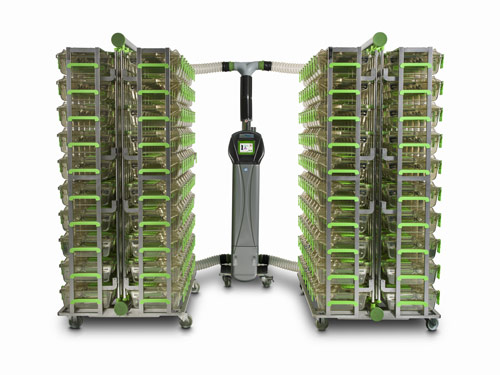In Vivo Safety Studies
Our 190 m2 facility in Vienna is fully equipped with a HEPA-filtered Individually Ventilated Cage (IVC) system preventing any risk of cross contamination. The facility has the capacity to operate multiple studies in parallel.
IVC System
The facility is fully GMP and GLP compliant and has been established to provide a high-quality, pathogen free environment for performing in vivo tests.
A strict segregation concept together with full GMP compliant validation of the facility, and associated systems ensures trustworthy test results.

A Range of Available In Vivo Tests
In vivo adventitious agent testing in suckling mice
The in vivo adventitious agent test in suckling mice investigates the presence of virus contaminations that cannot be detected in cell culture. The test endpoint is the detection of clinical signs of viral infection during a defined observation period.
In vivo adventitious agent testing in adult mice
The in vivo adventitious agent test in adult mice investigates the presence of virus contaminations that cannot be detected in cell culture. The test endpoint is the detection of clinical signs of viral infection during a defined observation period.
In vivo adventitious agent testing in guinea pigs
The in vivo adventitious agent test in guinea pigs investigates the presence of virus contaminations that cannot be detected in cell culture. The test endpoint is the detection of clinical signs of viral infection during a defined observation period.
In vivo adventitious agent testing in embryonated eggs
The in vivo adventitious agent test in embryonated eggs investigates the presence of virus contaminations that cannot be detected in cell culture. Endpoints are the detection of any clinical abnormalities and/or presence of hemagglutination.
Mouse antibody production test (MAP)
The MAP (mouse antibody production) test investigates viral contamination in the blood after a defined observation period by the analysis of antibody titres towards a defined panel of viral antigens.
Hamster antibody production test (HAP)
The HAP (hamster antibody production) test investigates viral contamination in the blood after a defined observation period by the analysis of antibody titres towards a defined panel of viral antigens.

The first ever test for adventitious agent testing was MAP-HAP developed more than two decades ago.